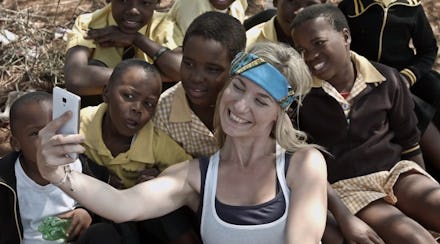One Hilarious Video Perfectly Sums Up a Big Problem With Western Humanitarianism

A development organization based in Norway put a creative twist on a trend you've probably seen in your Facebook and Instagram feeds.
"Let's Save Africa!" is the satirical video's call to action. It opens with a truck stopping abruptly in a grassy area, ostensibly in Africa because Africa is just one big country. A white, blond girl jumps out with high-calorie food in hand, dressed in a white tank top, shorts and a stylish bandanna. She runs toward an unknown destination and does what every good volunteer does: starts hurling food at hungry mouths.
The problem: For those who can afford it, there's an expansive menu of humanitarian activities to choose from: feeding malnourished children in rural Guatemala, painting with Typhoon Haiyan survivors in the Philippines or watching over orphaned babies in Uganda. And they all make for excellent fodder for the Facebook and Instagram accounts of those who travel abroad, a sociocultural badge of honor.
But the good intentions of affluent Westerners fundamentally drive "voluntourism," a term used by the columnist Rafia Zakaria to describe an inherently post-colonial commercial activity. "As admirably altruistic as it sounds," Zakaria writes, "the problem with voluntourism is its singular focus on the volunteer's quest for experience, as opposed to the recipient community's actual needs."
"Typically other people's problems seem simpler, uncomplicated and easier to solve than those of one's own society. In this context, the decontextualized hunger and homelessness in Haiti, Cambodia or Vietnam is an easy moral choice," Zakaria explains. "Unlike the problems of other societies, the failing inner-city schools in Chicago or the haplessness of those living on the fringes in Detroit is connected to larger political narratives. In simple terms, the lack of knowledge of other cultures makes them easier to help."
The novelist, photographer and artist Teju Cole teased out the trend of the "white savior industrial complex" in response to activism surrounding the viral Kony 2012 video. Joseph Kony, a warlord and fugitive Ugandan leader of the Lord's Resistance Army, is notorious for building an army with child soldiers, a crime that was the subject of a viral video that moved young Americans to act on behalf of Uganda's Invisible Children.
"There is much more to doing good work than 'making a difference.' There is the principle of first do no harm," Cole wrote in the Atlantic, "There is the idea that those who are being helped ought to be consulted over the matters that concern them."
Zakaria and Cole have a point. Real humanitarianism goes beyond orphanages, and efforts to stamp out poverty with two- to three-week volunteer trips. The issue is writ large in the amount of aid developed countries like the United States pour into countries, and often there is little incentive for long-term development goals when circumstances benefit the donor's interests.